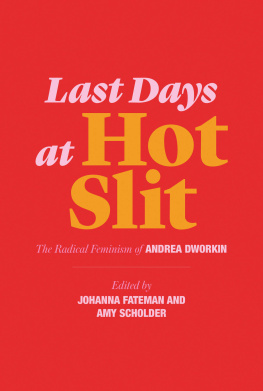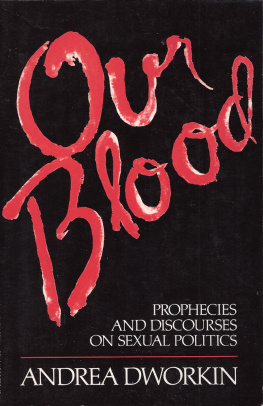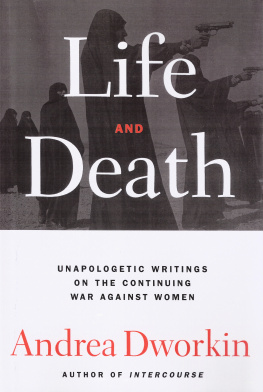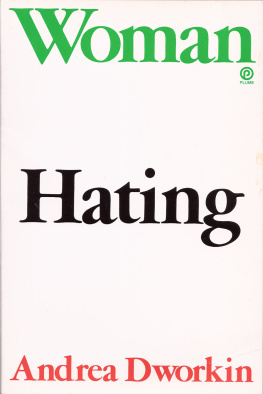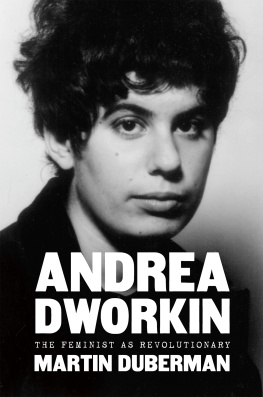Andrea Dworkin - Heartbreak: The Political Memoir of a Feminist Militant
Here you can read online Andrea Dworkin - Heartbreak: The Political Memoir of a Feminist Militant full text of the book (entire story) in english for free. Download pdf and epub, get meaning, cover and reviews about this ebook. year: 2007, publisher: Bloomsbury Publishing PLC, genre: Non-fiction. Description of the work, (preface) as well as reviews are available. Best literature library LitArk.com created for fans of good reading and offers a wide selection of genres:
Romance novel
Science fiction
Adventure
Detective
Science
History
Home and family
Prose
Art
Politics
Computer
Non-fiction
Religion
Business
Children
Humor
Choose a favorite category and find really read worthwhile books. Enjoy immersion in the world of imagination, feel the emotions of the characters or learn something new for yourself, make an fascinating discovery.

- Book:Heartbreak: The Political Memoir of a Feminist Militant
- Author:
- Publisher:Bloomsbury Publishing PLC
- Genre:
- Year:2007
- Rating:5 / 5
- Favourites:Add to favourites
- Your mark:
- 100
- 1
- 2
- 3
- 4
- 5
Heartbreak: The Political Memoir of a Feminist Militant: summary, description and annotation
We offer to read an annotation, description, summary or preface (depends on what the author of the book "Heartbreak: The Political Memoir of a Feminist Militant" wrote himself). If you haven't found the necessary information about the book — write in the comments, we will try to find it.
Heartbreak: The Political Memoir of a Feminist Militant — read online for free the complete book (whole text) full work
Below is the text of the book, divided by pages. System saving the place of the last page read, allows you to conveniently read the book "Heartbreak: The Political Memoir of a Feminist Militant" online for free, without having to search again every time where you left off. Put a bookmark, and you can go to the page where you finished reading at any time.
Font size:
Interval:
Bookmark:
Music 1
I studied music when I was a child, the piano as taught by Mrs. Smith. She was old with white hair. She represented culture with every gesture while I was just a plebe kid. But I learned: discipline and patience from Czerny, the way ideas can move through sound from Bach, how to say Fuck you from Mozart. Mrs. Smith might have thought herself the reigning sensibility, and she did get between the student and the music with a stunning regularity, but if you could hear you could learn and if you learned it in your body you knew it forever. The fingers were the wells of musical memory, and they provided a map for the cognitive faculties. I can remember writing out the notes and eventually grasping the nature of the piano, percussive and string, the richness and range of the sound. I wanted music in writing but not the way Verlaine did, not in the syllables themselves; anything pronounced would have sound and most sound is musical; no, in a different way. I recognized early on how the great classical composers, but especially and always Bach, could convey ideas without using any words at all. Repetition, variation, risk, originality, and commitment created the piece and conveyed the ideas. I wanted to do that with writing. Id walk around with poems by Rimbaud or Baudelaire in my pocket - bilingual, paperback books with the English translations reading like prose poems - and I'd recognize that the power of the poems was not unlike the power of music. For a while, I hoped to be a pianist, and my mother took me into Philadelphia, the big city, to study with someone a great deal more pretentious and more expensive than Mrs. Smith. But then I tried to master Tchaikovskys Piano Concerto No. 1, for which I had developed a somewhat warped passion, and could not. That failure told me that I could not be a musician, although I continued to study music in college.
The problem with that part of my musical education was that I stopped playing piano, and Bennington, the college I went to, insisted that one play an instrument. I didnt like my piano teacher, and I wasnt going to play or spend one minute of one day with him hovering over my shoulder and condemning me with a baronial English that left my prior teachers in my mind as plain-speaking people. I loved the theory classes. Mine was with the composer Vivian fine. The first assignment, which was lovely, was to write a piece for salt and pepper shakers. I wrote music away from the piano for the piano, but after the first piano lesson I never deigned to darken the piano teachers doorway again. At the end of the year, this strategy of noncompliance turned out to be the equivalent of not attending physical education in high school: you couldnt graduate without having done the awful crap. When my adviser, also a musician but never a teacher of music to me, asked me why I hadnt shown up for any of the piano lessons, I felt awkward and stupid but I gave him an honest answer: I dont like the asshole. My adviser smiled with one of his this-is-too-good-to-be-true looks - he was amused - and said hed take care of it. He must have, or I would not have passed.
My adviser, the composer Louis Callabro, taught me a lot about music, but there was always a kind of cross-fertilization - Id bring the poems, the short stories, every now and then a novel. Lou was a drunkard, much more his style than being an alcoholic. I had met him without knowing it on first arriving at Bennington. I loved the old music building and sort of haunted it. He came out of his studio, pissing drunk, stared at me, and said, Never sleep with a man if you want to be his friend. I adored the guy. Eventually Id show him my music and hed show me his short stories. It was a new version of Ill-show-you-mine-if-you-show-me-yours. I later understood that the all-girl Benningtons expectation was that the girl, the woman, any female student, should learn how to be the mistress of an artist, not the artist herself: this in the college that was the early home of Martha Graham. The equality between Lou and myself, our mutual recognition, was no part of the schools agenda. This is not to suggest that Lou did not screw his students: he did; they all did. I always thought that I would go to heaven because at Bennington I never slept with faculty members, only their wives.
Music 2
Mrs. Smith used to give her students stars and points for memorizing pieces. I was used to being a good student. I got a lot of stars and a lot of points. But there was a piece I could never remember. I worked on it for months, and the denouement was in the two terrible black stars she gave me to mark my failure. The piece was Tales from the Vienna Woods by Strauss. I like to think that my inability to stomach that piece was a repudiation of the later Strausss Nazi politics, even though I didnt know about the former or the latters politics at the time (and theyre not related). In the same way, there was a recurrent nightmare I had when I stayed with my mothers mother, Sadie Spiegel. The room got smaller and smaller and I had trouble breathing. The tin soldiers I associated with Tales were like a drum corps around the shrinking room. Later, cousins told me about their fathers sexual molestation of them. Their father was Sadies favorite, the youngest of her children; he was brilliant as well as blond and beautiful, had a role in inventing the microchip, and he stuck his penis down the throats of at least two of his children when they were very young, including when they were infants - I assume to elicit the involuntary sucking response. Even though my cousins told me this horror years later, I like to think that reality runs like a stream, except that time isnt linear and the nightmare was a synthesis, Strauss and my uncle, Nazis both. And yes, I mean it. A man who sticks his cock in an infants mouth belongs in Himmlers circle of hell.
Music 3
There was jazz and Bessie Smith. When I'd cut high school or college and go to Eighth Street in New York City, I'd find used albums. I listened to every jazz great I could find. My best friend in high school particularly liked Maynard Fergusson, a white jazz man. I went to hear him at the Steel Pier in Atlantic City when I was a kid. (I also went to hear Ricky Nelson at the Steel Pier. I stood among hundreds of screaming girl teens but up front. The teens who fainted, I am here to tell you, fainted from the heat of a South Jersey summer misspent in a closed ballroom. Still, I adored Ricky and Pat Boone and, special among specials, Tab Hunter with his cover of Red Sails in the Sunset. ) There was no gambling then, just miles of boardwalk with penny arcades, cotton candy, saltwater taffy, root-beer sodas in frosted-glass mugs; and sand, ocean, music. I listened to Coltrane, had a visceral love of Charlie Parker that I still have, listened to K. C. Blues covers wherever I could find them. When I was a teen, I also came across Billie Holiday, and her voice haunts me to this day - I can hear it in my head anytime - and with Strange Fruit and God Bless the Child she sounded more like a blues singer than a jazz woman; but the bulk of her work, which I heard later, was jazz. It was her voice that was blues. When her voice wasnt blues, it meant the heroin had dragged her way down and she couldnt go lower. Strange Fruit was worth anything it took from her, and so was God Bless the Child. Im not happy with art as necrophilia, but I think these two songs, and Strange Fruit in particular, were worth her life. Theyd be worth mine.
My brother, Mark, and I both had a taste for the Ahmad Jamal Quartet. I loved the live jazz in the clubs, the informal jazz I found live in the apartments of various lovers, and I wanted to hear anyone I was lucky enough to hear about. I craved jazz music, and the black world was where one found it. There was a tangle of sex and jazz, black culture and black male love. There was a Gordian knot made of black men and Jewish white women in particular. Speaking only for myself, I wasnt going to settle in the suburbs, and New York City meant black, jazz meant black, blues meant black.
Next pageFont size:
Interval:
Bookmark:
Similar books «Heartbreak: The Political Memoir of a Feminist Militant»
Look at similar books to Heartbreak: The Political Memoir of a Feminist Militant. We have selected literature similar in name and meaning in the hope of providing readers with more options to find new, interesting, not yet read works.
Discussion, reviews of the book Heartbreak: The Political Memoir of a Feminist Militant and just readers' own opinions. Leave your comments, write what you think about the work, its meaning or the main characters. Specify what exactly you liked and what you didn't like, and why you think so.

